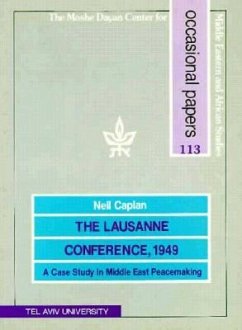This is the first scholarly monograph devoted exclusively to the Lausanne Conference of April-September 1949 - one of the rare occasions on which Israel and the Arab states were assembled together for peace talks. Basing himself on extensive archival documentation and other original source materials in English, Hebrew, Arabic, and French, Dr. Caplan has reconstructed the motives and calculations which lay behind the hard-line posturing which Arab and Israeli delegations adopted during the Lausanne talks. Of particular importance is the behind-the-scenes role played by the United States, which went beyond its participation as one of the three members of the Conciliation Commission. For the United Nations and the United States, the failure of the Lausanne peace process was the first of several episodes demonstrating the real limitations of third-party intervention in the quest for a solution to the intractable Arab-Israeli conflict.
Hinweis: Dieser Artikel kann nur an eine deutsche Lieferadresse ausgeliefert werden.
Hinweis: Dieser Artikel kann nur an eine deutsche Lieferadresse ausgeliefert werden.








